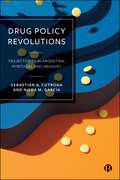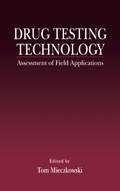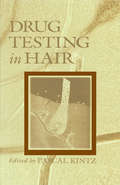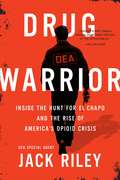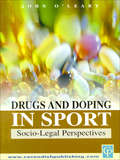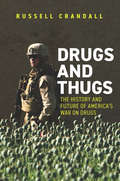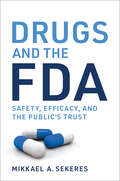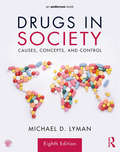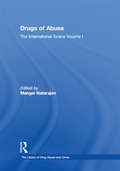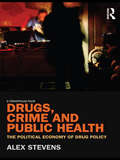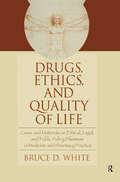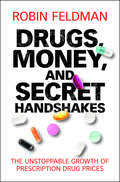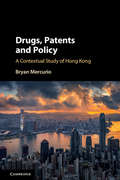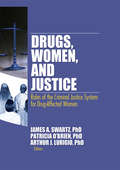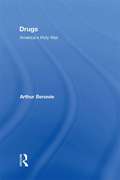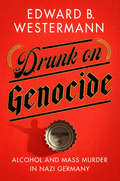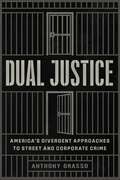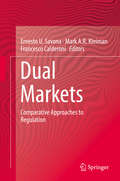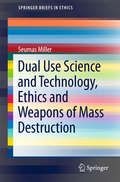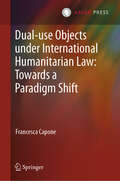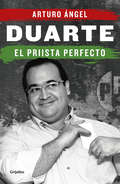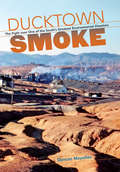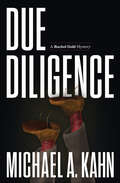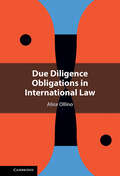- Table View
- List View
Drug Policy Revolutions: Trajectories in Argentina, Portugal, and Uruguay
by Sebastián A. Cutrona Nilda M. GarcíaCoinciding with a wave of drug policy liberalization around the world, this book analyzes the experiences of Argentina, Portugal, and Uruguay in their efforts at depenalization, decriminalization, and legalization/regulation of recreational drugs. The authors present the successes and challenges of the approaches and their impacts on drug use, public health, and security, debunking some of the myths surrounding flexible drug policies along the way. Contrasting the three liberalization cases with the criminalization approach of the US at federal level, the book offers policy recommendations and lessons learned from the historical trajectories and policy reforms in addressing drug consumption and its associated harms.
Drug Testing Technology: Assessment of Field Applications
by Tom MieczkowskiCovering a wide range of research currently being done in drug analysis, Drug Testing Technology: Assessment of Field Applications compares and evaluates various methods used to determine abused drugs taken by individuals, and their application in various programs and contexts. Controversies associated with various methods, including urine analysis and hair analysis, are examined. Contributors from a wide diversity of disciplines offer advanced knowledge, encompassing work which is technical as well as markedly philosophical. Chapters provide overviews of drug incorporation into hair; the use of hair analysis for compliance measurement in the use of anti-epileptic medications; and the application of drug testing to the psychiatric treatment of substance abuse disorders. Drug Testing Technology: Assessment of Field Applications provides information useful in medical applications, workplace testing, criminal justice monitoring community epidemiology, and drug treatment assessment.
Drug Testing in Hair
by Pascal KintzDrug Testing in Hair is the first book on this timely and controversial topic. The book's purpose is to validate hair testing as an accepted form of evidence for use in courts and elsewhere, such as the military and the workplace. This volume presents the most recent experiments and clinical applications to provide missing information and insight into the unanswered questions of hair testing.Active researchers working in hair testing have contributed chapters to this book. New data, never before published, are incorporated into the text, so the reader receives cutting-edge information from experts in the field. This is must-have information on everything you need to know about drug testing in hair.
Drug Warrior: Inside the Hunt for El Chapo and the Rise of America's Opioid Crisis
by Mitch Weiss Jack RileyDEA Agent Jack Riley, "[Chicago's] most famous federal agent since the days of The Untouchables" (-Rolling Stone) tells the inside story of his 30-year hunt for the drug kingpin known as El Chapo, and reveals the true causes of the American opioid epidemic. Jack Riley, grandson of a Chicago cop known for using his fists, was born to be a drug warrior. Joaquín "El Chapo" Guzmán Loera, who farmed marijuana and opium poppies as a teenager in Mexico, was born to be a drug lord. Their worlds collided when Riley, a career special agent with the Drug Enforcement Administration, was promoted to lead the fight against Chapo on the border at El Paso.Drug Warrior is the story of Riley's decades-long hunt for the world's most wanted drug lord, set against the rise of modern international drug trafficking, and America's spiraling opioid epidemic. Jack Riley started his career as an undercover street agent in Chicago busting small-time dealers. By the time he worked his way up to second in command of the DEA-a post few field agents ever reach-he had overseen every major mission to capture foreign drug kingpins since the 1990s, and had witnessed first-hand how El Chapo changed the game. As brilliant as he was lethal, Chapo not only decimated his competition, he foresaw Americans' dependence on opioids and heroin, and manipulated supply to increase demand. Riley's story culminates as he and the DEA win their greatest victory-the capture and extradition of his long-time nemesis-and Chapo faces his darkest fear: U.S. justice. A riveting memoir of life inside the drug wars, and a never-before-seen glimpse of the inner-workings of the DEA, Drug Warrior is a critical examination of how America's opioid crisis came to be, and the extraordinary people fighting it.
Drugs & Doping in Sports
by John O'LearyDoping is undoubtedly one of the most controversial issues within sport. Doping scandals wreck the careers of sportsmen and women,they can bankrupt governing bodies, infringe personal liberties, threaten livelihoods, tarnish images, galvanise the European Union, undermine the Olympic Movement and invoke invective from politicians. In recent years, sports law has developed into one of the most exciting and challenging legal disciplines and the importance of the law in doping matters has been heightened by the influx of money into sport and the development of sport as a global economy. Drugs and Doping in Sport brings together work from leading academics, practitioners and administrators, analyses contemporary socio-legal and political themes related to doping in sport. It provides a challenging and often controversial view of doping issues and confronts political and legal orthodoxy, supplying the reader with a unique insight into this fascinating area of academic study.
Drugs and Thugs: The History and Future of America's War on Drugs
by Russell C. CrandallA sweeping and highly readable work on the evolution of America&’s domestic and global drug war How can the United States chart a path forward in the war on drugs? In Drugs and Thugs, Russell Crandall uncovers the full history of this war that has lasted more than a century. As a scholar and a high-level national security advisor to both the George W. Bush and Obama administrations, he provides an essential view of the economic, political, and human impacts of U.S. drug policies. Backed by extensive research, lucid and unbiased analysis of policy, and his own personal experiences, Crandall takes readers from Afghanistan to Colombia, to Peru and Mexico, to Miami International Airport and the border crossing between El Paso and Juarez to trace the complex social networks that make up the drug trade and drug consumption. Through historically driven stories, Crandall reveals how the war on drugs has evolved to address mass incarceration, the opioid epidemic, the legalization and medical use of marijuana, and America&’s shifting foreign policy.
Drugs and the FDA: Safety, Efficacy, and the Public's Trust
by Mikkael A. SekeresHow the FDA was shaped by public health crises and patient advocacy, told against a background of the contentious hearings on the breast cancer drug Avastin.Food and Drug Administration approval for COVID-19 vaccines and the controversial Alzheimer&’s drug Aduhelm made headlines, but few of us know much about how the agency does its work. Why is the FDA the ultimate US authority on a drug&’s safety and efficacy? In Drugs and the FDA, Mikkael Sekeres—a leading oncologist and former chair of the FDA&’s cancer drug advisory committee—tells the story of how the FDA became the most trusted regulatory agency in the world. It took a series of tragedies and health crises, as well as patient advocacy, for the government to take responsibility for ensuring the efficacy and safety of drugs and medical devices. Before the FDA existed, drug makers could hawk any potion, claim treatment of any ailment, and make any promise on a label. But then, throughout the twentieth century, the government was forced to take action when children were poisoned by contaminated diphtheria and smallpox vaccines, an early antibiotic contained antifreeze, a drug prescribed for morning sickness in pregnancy caused babies to be born disfigured, and access to AIDS drugs was limited to a few clinical trials while thousands died. Sekeres describes all these events against the backdrop of the contentious 2011 hearings on the breast cancer drug Avastin, in which he participated as a panel member. The Avastin hearings, he says, put to the test a century of the FDA&’s evolution, demonstrating how its system of checks and balances works—or doesn&’t work.
Drugs in Society: Causes, Concepts, and Control
by Michael D. LymanDrugs in Society: Causes, Concepts, and Control, Eighth Edition, focuses on the many critical areas of America's drug problem, providing a foundation for rational decision-making within this complex and multidisciplinary field. Lyman offers a comprehensive big-picture examination of the US drug problem, dealing with drugs, abusers, drug enforcement, and public policy. Organized in three sections: Understanding the Problem, Gangs and Drugs, and Fighting Back, topics covered include the business of drugs and the role of organized crime in the drug trade, drug legalization and decriminalization, legal and law enforcement strategies, an analysis of the socialization process of drug use and abuse, and a historical discussion of drug abuse that puts the contemporary drug problem into perspective. Suitable for upper-level undergraduates in Criminal Justice, Criminology, and related programs, Drugs in Society, Eighth Edition, uses logical organization and strong pedagogy (case studies, focused text boxes with related information, critical thinking tasks) to support learning objectives.
Drugs of Abuse: Volume I (The Library of Drug Abuse and Crime)
by Mangai NatarajanGlobalization and attendant modernization has increased both the supply and the demand for drugs around the world. Drug abuse is no longer the concern of only the developed world. Countries without histories of drug use, particularly developing countries, are now reporting problems of abuse because they have become transit points for international drug trafficking. Because the problem is now worldwide, a global strategy is needed for identifying, analyzing and developing strategies to deal with drug abuse and the associated problems for health and safety. This volume reviews the international status of drug abuse. Specific topics covered include drug abuse in the developing world, emerging drugs and poly drug use; gateway drugs, cultural views of drug use and state of the art methodologies employed in research on drug abuse.
Drugs, Addiction, And The Law: Policy, Politics, And Public Health
by Peter J. CohenAmerican physician and attorney Cohen discusses legal, ethical, and policy considerations faced by society as it deals with psychoactive drug use. A recurring theme is the need to balance individual liberty and autonomy with the needs of society. None of the several models that have been devised to that end is completely satisfying, he says, and all of them raise important questions. The book cites legislation and court decisions extensively.
Drugs, Crime and Public Health: The Political Economy of Drug Policy
by Alex StevensDrugs, Crime and Public Health provides an accessible but critical discussion of recent policy on illicit drugs. Using a comparative approach - centred on the UK, but with insights and complementary data gathered from the USA and other countries - it discusses theoretical perspectives and provides new empirical evidence which challenges prevalent ways of thinking about illicit drugs. It argues that problematic drug use can only be understood in the social context in which it takes place, a context which it shares with other problems of crime and public health. The book demonstrates the social and spatial overlap of these problems, examining the focus of contemporary drug policy on crime reduction. This focus, Alex Stevens contends, has made it less, rather than more, likely that long-term solutions will be produced for drugs, crime and health inequalities. And he concludes, through examining competing visions for the future of drug policy, with an argument for social solutions to these social problems.
Drugs, Ethics, and Quality of Life: Cases and Materials on Ethical, Legal, and Public Policy Dilemmas in Medicine and Pharmacy Practice
by Bruce D. WhiteWeigh pivotal healthcare ethics, law, and public policy issues that resulted in tipping-point legal actionsWeighing the ethical considerations in healthcare and drug issues can be emotionally difficult and mentally challenging. Drugs, Ethics, and Quality of Life: Cases and Materials on Ethical, Legal, and Public Policy Dilemmas in Medicine and Pharmacy Practice is a fascinating casebook that clearly discusses the most contentious ethical conflicts that resulted in legal actions. This easy-to-read text provides all sides of controversial real-life cases that provoke spirited debate while teaching the fundamentals of pharmacy law and ethics. The book is a unique exploration into the basic principles of bioethics, end of life care, and drug research. Drugs, Ethics, and Quality of Life explains in detail the concepts of ethics, quality of life, beneficence, nonmaleficence, autonomy, and justice. Recent cases provide illuminating backdrops for the exploration of these concepts, making them easily understood. A special introduction includes important information about ethics and the pharmaceutical code of ethics. Two appendixes provide further opportunities for discussion and the examination of law and decisions, and resources about drug use decisions and situations. This thought-provoking textbook plainly shows the crucial role ethics plays in today&’s society. Ethical topics explored in Drugs, Ethics, and Quality of Life includes legal cases on: tobacco COX-2 inhibitors medical marijuana the "morning after" pill and other emergency contraceptives pain medications and palliative care drugs physician-assisted suicide drug use in medically futile situations gene therapy Drugs, Ethics, and Quality of Life is valuable, insightful reading as well as a good adjunct text for pharmacy students, pharmacists, medical students, physicians, bio
Drugs, Money, and Secret Handshakes: The Unstoppable Growth of Prescription Drug Prices
by Robin FeldmanIn the warped world of prescription drug pricing, generic drugs can cost more than branded ones, old drugs can be relaunched at astronomical prices, and low-cost options are shut out of the market. In Drugs, Money and Secret Handshakes, Robin Feldman shines a light into the dark corners of the pharmaceutical industry to expose a web of shadowy deals in which higher-priced drugs receive favorable treatment and patients are channeled toward the most expensive medicines. At the center of this web are the highly secretive middle players who establish coverage levels for patients and negotiate with drug companies. By offering lucrative payments to these middle players (as well as to doctors and hospitals), drug companies ensure that inexpensive drugs never gain traction. This system of perverse incentives has delivered the kind of exorbitant drug prices - and profits - that everyone loves except for those who pay the bills.
Drugs, Patents and Policy: A Contextual Study of Hong Kong
by Bryan MercurioIn pharmaceutical patent law, the problem of lack of policy direction and inappropriate legal framework is widespread - particularly among jurisdictions with little to no pharmaceutical research or manufacturing. This book aims to inform public policy and influence debate through a comprehensive review of Hong Kong's pharmaceutical patent law. By demonstrating the need for a holistic review of pharmaceutical patent laws and evaluating Hong Kong's system in light of health policy, economic and social factors, Bryan Mercurio recommends changes to the legal framework and constructs a more efficient and effective system for Hong Kong. He thoroughly evaluates the international framework and best practice models to offer a global perspective to each issue before providing local context in the analysis. While the focus of the book is Hong Kong, the analysis on pharmaceutical patent law and policy extends to other jurisdictions facing issues on reforming their national system.
Drugs, Women, and Justice: Roles of the Criminal Justice System for Drug-Affected Women
by Arthur J. Lurigio James A. Swartz Patricia O’BrienA unique interdisciplinary exploration of a pressing social issueThe numbers of women offenders involved in the correctional system are quickly growing. Drugs, Women, and Justice: Roles of the Criminal Justice System for Drug-Affected Women gathers a distinguished group of researchers and policy analysts into one volume to explore the broad social and individual implications of current policy and practice pertaining to women in the criminal justice system. This valuable resource provides readers with a superb overview of the current state of knowledge and provides recommendations for new directions. Each top-notch chapter was originally presented at the 2005 Drugs, Women, and Justice Symposium, held on the University of Illinois at Chicago campus and sponsored by the Jane Addams College of Social Work Substance Abuse Research Collaboration through a grant from the National Institute on Drug Abuse.Traditionally, criminal justice studies and rehabilitation programs have focused on male offenders. Recent studies reinforce the current evidence that females should have their needs addressed differently. This unique book presents the latest research and thinking in complex and still emerging areas of policy and treatment for women in the criminal justice system.Topics in Drugs, Women, and Justice: Roles of the Criminal Justice System for Drug-Affected Women include: characteristics of drug-involved women in the criminal justice system the negative impact on families of punitive drug laws and child welfare legislation assessing and managing the service needs of children whose mothers have been arrested influences of feelings of isolation on the course of rehabilitation demographic differences between women in drug treatment and drug-involved women in the criminal justice system service needs of women released from prison a program developed for women who have survived traumatic violence, working in the street economy, and the criminal justice system the direct and indirect impact of mass incarceration on women and more Drugs, Women, and Justice: Roles of the Criminal Justice System for Drug-Affected Women is essential reading for researchers, criminologists, sociologists, social workers, psychologists, clinicians, feminists, and policymakers in the areas of social welfare, criminal justice, and drug policy.
Drugs: America's Holy War
by Arthur BenavieUsing the best scientific evidence, Drugs: America's Holy War explores the impact and cost of America's "War on Drugs" - both in tax spending and in human terms. Is it possible that US drug policies are helping to proliferate, not prevent, a multitude of social ills including: homicide, property crime, the spread of AIDS, the contamination of drugs, the erosion of civil liberties, the punishment of thousands of non-violent people, the corruption of public officials, and the spending of billions of tax dollars in an attempt to prevent certain drugs from entering the country? In this controversial new book, award-winning economist Arthur Benavie analyzes the research findings and argues that an end to the war on drugs, much as we ended alcohol prohibition, would yield enormous international benefits, destroy dangerous and illegal drug cartels, and allow the American government to refocus its attention on public well-being.
Drunk on Genocide: Alcohol and Mass Murder in Nazi Germany (Battlegrounds: Cornell Studies in Military History)
by Edward B. WestermannIn Drunk on Genocide, Edward B. Westermann reveals how, over the course of the Third Reich, scenes involving alcohol consumption and revelry among the SS and police became a routine part of rituals of humiliation in the camps, ghettos, and killing fields of Eastern Europe. Westermann draws on a vast range of newly unearthed material to explore how alcohol consumption served as a literal and metaphorical lubricant for mass murder. It facilitated "performative masculinity," expressly linked to physical or sexual violence. Such inebriated exhibitions extended from meetings of top Nazi officials to the rank and file, celebrating at the grave sites of their victims. Westermann argues that, contrary to the common misconception of the SS and police as stone-cold killers, they were, in fact, intoxicated with the act of murder itself. Drunk on Genocide highlights the intersections of masculinity, drinking ritual, sexual violence, and mass murder to expose the role of alcohol and celebratory ritual in the Nazi genocide of European Jews. Its surprising and disturbing findings offer a new perspective on the mindset, motivation, and mentality of killers as they prepared for, and participated in, mass extermination.Published in Association with the US Holocaust Memorial Museum.
Dual Justice: America’s Divergent Approaches to Street and Corporate Crime (Chicago Series in Law and Society)
by Anthony GrassoA far-reaching examination of how America came to treat street and corporate crime so differently. While America incarcerates its most marginalized citizens at an unparalleled rate, the nation has never developed the capacity to consistently prosecute corporate wrongdoing. Dual Justice unearths the intertwined histories of these two phenomena and reveals that they constitute more than just modern hypocrisy. By examining the carceral and regulatory states’ evolutions from 1870 through today, Anthony Grasso shows that America’s divergent approaches to street and corporate crime share common, self-reinforcing origins. During the Progressive Era, scholars and lawmakers championed naturalized theories of human difference to justify instituting punitive measures for poor offenders and regulatory controls for corporate lawbreakers. These ideas laid the foundation for dual justice systems: criminal justice institutions harshly governing street crime and regulatory institutions governing corporate misconduct. Since then, criminal justice and regulatory institutions have developed in tandem to reinforce politically constructed understandings about who counts as a criminal. Grasso analyzes the intellectual history, policy debates, and state and federal institutional reforms that consolidated these ideas, along with their racial and class biases, into America’s legal system.
Dual Markets
by Francesco Calderoni Ernesto U. Savona Mark A.R. KleimanThis comprehensive volume analyzes dual markets for regulated substances and services, and aims to provide a framework for their effective regulation. A "dual market" refers to the existence of both a legal and an illegal market for a regulated product or service (for example, prescription drugs). These regulations exist in various countries for a mix of public health, historical, political and cultural reasons. Allowing the legal market to thrive, while trying to eliminate the illegal market, provides a unique challenge for governments and law enforcement. Broken down into nine main sections, the book studies comparative international policies for regulating these "dual markets" from a historical, legal, and cultural perspective. It includes an analysis of the markets for psychoactive substances that are illegal in most countries (such as marijuana, cocaine, opiods and amphetimines), psychoactive substances which are legal in most countries and where consumption is widespread (such as alcohol and tobacco), and services that are generally regulated or illegal (such as sports betting, the sex trade, and gambling). For each of these nine types of markets, contributions focus on the relationship between regulation, the emerging illegal market, and the resulting overall access to these services. This work aims to provide a comprehensive framework from a historical, cultural, and comparative international perspective. It will be of interest to researchers in criminology and criminal justice, particularly with an interest in organized crime, as well as related fields such as sociology, public policy, international relations, and public health.
Dual Use Science and Technology, Ethics and Weapons of Mass Destruction (Springerbriefs In Ethics Ser.)
by Seumas MillerThis book deals with the problem of dual-use science research and technology. It first explains the concept of dual use and then offers analyses of collective knowledge and collective ignorance. It goes on to present a theory of collective responsibility, followed by four chapters focusing on a particular scientific field or industry of dual use concern: the chemical industry, the nuclear industry, cyber-technology and the biological sciences. The problem of dual-use science research and technology arises because such research and technology has the potential to be used for great evil as well as for great good. On the one hand, knowledge is a necessary condition, and perhaps a constitutive feature, of technologies that contribute greatly to individual and collective well-being. Consider, for example, nuclear technology that enables the generation of low cost electricity in populations without obvious alternative energy sources. So technological knowledge is a good thing and ignorance of it a bad thing. On the other hand, these same technologies can be extremely harmful to individuals and collectives, as with the atomic bombs dropped on Hiroshima and Nagasaki. So, at least with respect to some technologies evidently knowledge is a bad thing and ignorance a good thing. Accordingly, the question arises as to whether we ought to limit scientific research and/or the development of technology and, if so, which research or technology, in what manner and to what extent. This book examines the answer to that question.
Dual-use Objects under International Humanitarian Law: Towards a Paradigm Shift
by Francesca CaponeThis book deals with a crucial and yet under-explored topic that has increasingly gained momentum during modern armed conflicts, i.e. dual-use objects under international humanitarian law (IHL). Dual-use objects, such as energy infrastructures, water installations and civilian means of transportation and communication, which could be used also for military purposes, is a term that has entered the IHL jargon but has not attained the status of a legal concept. Dual-use objects are easily identifiable and yet remain difficult to pin down, in particular when it comes to separating them from military objectives and determining the applicable rules to enhance their protection. Although attacks against critical infrastructures are traditionally justified as being part of a legitimate military strategy, experts and, in some instances, governments are uncomfortable with the idea of depriving the civilian population of services and goods essential to its survival. Yet, the sense of discomfort has not led to any significant improvement and &‘dual-use objects&’ remain on the target lists of most belligerents. A number of factors, which this book analyses to explain the rise and rationale behind the current 'mainstream approach' to dual-use objects, contributed to cementing the status quo. The present book, building on these premises, pursues a twofold aim. First, this book seeks to fill a significant gap in the IHL scholarship in light of the limited attention that the topic has received so far. Second, this book aims to challenge the mainstream approach through a rigorous inquiry and the development of a new paradigm. The paradigm shift, which is at the heart of this study, places under the spotlight the civilian function of dual-use objects and reclaim the central role of the individual actors that plan, order and execute attacks against these targets. This book aspires to become an essential tool for academics and practitioners working in the IHL field, but at the same time its readership is expected to include students at all levels that have an interest in the topic and seeks to approach it in an innovative way. Francesca Capone is Associate Professor of International Law at the Institute DIRPOLIS of the Scuola Superiore Sant&’Anna in Pisa, Italy.
Duarte, el priista perfecto
by Arturo Ángel«El sexenio de Duarte es un gran ejemplo de la forma en que opera el sistema político mexicano. Duarte no es una anormalidad, sino un caso más» Daniel Moreno / Del Prólogo Javier Duarte encarna la definición de «político corrupto»: saqueó las arcas públicas, robó miles de millones de pesos, creó una red para ocultar sus delitos, alimentó los compadrazgos, despreció la ley y ultrajó al pueblo que gobernaba. Pero el veracruzano no es un caso aislado... El exgobernador pudo perpetrar sus transas gracias a que fue protegido por sus compañeros priistas: su «logro» fue llevar a un nivel delirante usos y costumbres de sus correligionarios. Duarte: el priista perfecto documenta a detalle la vida del hombre que Enrique Peña Nieto presumió como ejemplo de «la nueva generación» del PRI. Con un ritmo trepidante, el reportero Arturo Ángel reconstruye la historia del exmandatario, desde su infancia de pobreza en Córdoba hasta sus cenas de 300 mil pesos en Veracruz, desde su meteórico ascenso en los pasillos del poder en Xalapa hasta su derrumbe en los calabozos de Guatemala. El periodista -coautor de la investigación que llevó a la captura de Duarte- explica el sistema empleado para desfalcar a todo un estado, da nombres y apellidos de los cómplices del político y ofrece una legión de datos acerca de la cleptómanía del priista y sus protectores. Finalmente, Arturo Ángel lanza la alerta: el esquema de robo usado por el exgobernador sigue vivo y se expande. A fin de cuentas, si Duarte robó, lo hizo también para financiar campañas políticas; las redes de impunidad que creó ya operan en otros estados, sus padrinos siguen medrando y decenas de sus cómplices y mentores aún disfrutan de total impunidad
Ducktown Smoke: The Fight Over One of the South's Greatest Environmental Disasters
by Duncan MaysillesIt is hard to make a desert in a place that receives sixty inches of rain each year. But after decades of copper mining, all that remained of the old hardwood forests in the Ducktown Mining District of the southern Appalachian Mountains was a fifty-square mile barren expanse of heavily gullied red hills--a landscape created by sulfur dioxide smoke from copper smelting and destructive logging practices. In Ducktown Smoke, Duncan Maysilles examines this environmental disaster, one of the worst the South has experienced, and its impact on environmental law and Appalachian conservation. Beginning in 1896, the widening destruction wrought in Tennessee, Georgia, and North Carolina by Ducktown copper mining spawned hundreds of private lawsuits, culminating in Georgia v. Tennessee Copper Co. , the U. S. Supreme Court's first air pollution case. In its 1907 decision, the Court recognized for the first time the sovereign right of individual states to protect their natural resources from transborder pollution, a foundational opinion in the formation of American environmental law. Maysilles reveals how the Supreme Court case brought together the disparate forces of agrarian populism, industrial logging, and the forest conservation movement to set a legal precedent that remains relevant in environmental law today.
Due Diligence (Attorney Rachel Gold Mysteries #0)
by Michael A. Kahn"Quite definitely addictive . . . a must-read, written with wit and humor and peopled with multidimensional characters. What more could a reader ask for?" —Mary Balogh, New York Times bestselling authorThe phone call Rachel Gold received from a nervous CPA almost seemed routine. Rosenthal wanted to meet with her to discuss something confidential about a corporate merger. Hardly an unusual request of a lawyer. But Rosenthal never made it to the meeting—and when his corpse is discovered, it was clear he had died under circumstances too bizarre to believe. Having never even met the murdered CPA, Rachel is willing to let the police try to close the case. But that all changes with the next victim—someone so dear to Rachel that the hunt for the killer becomes her personal vendetta.What lethal facts did the slain accountant find buried in the books of Armstrong Bioproducts while doing the pre-merger due diligence? Was there any connection between that pharmaceutical company and the presidential campaign of Rachel's political hero, Dr. Douglas Armstrong? Armstrong, the founder of Armstrong Bioproducts, is now the junior senator from Missouri. And what was the significance, if any, of the yellowed typewritten lists of names of residents of two St. Louis nursing homes that had gone out of business decades earlier?Teaming up again with her best friend, Benny Goldberg, Rachel seeks her own measure of vengeance. As other corpses show up, her pursuit will take her from the upper strata of St. Louis society to the elaborate network of limestone caves far beneath the streets of St. Louis, where the answers to the mystery—along with the murderers themselves—await her arrival.
Due Diligence Obligations in International Law
by Alice OllinoDue diligence obligations are typically described by scholars and practitioners as 'elusive', 'weak', and difficult to pin down in the abstract. Challenging these assumptions, this book offers a systematic reconstruction of the foundations of due diligence obligations of states and explores their nature, rationale, content and scope of operation in international law. Tackling due diligence from a general perspective, this book seeks to complement scholarly studies on public international law obligations and their theory. This book will be relevant for academics, practitioners, graduate students across international law and anyone seeking to better conceptualise due diligence under international law and understand how due diligence obligations are operationalised in practice.
